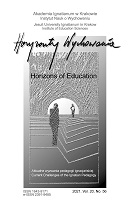Godność dziecka w jezuickiej myśli pedeutologicznej okresu staropolskiego
Child’s Dignity in the Jesuit Pedeutological Thought of the Old Polish Period
Author(s): Anna KrólikowskaSubject(s): Christian Theology and Religion, Education, History of Education, Pedagogy
Published by: Uniwersytet Ignatianum w Krakowie
Keywords: child; dignity; teacher; pedeutology; Jesuits;
Summary/Abstract: RESEARCH OBJECTIVE: The objective of this article is to show the vision of a child and his/her dignity promoted in the Jesuit pedeutological thought. THE RESEARCH PROBLEM AND METHODS: In order to answer this question, works of the greatest Jesuit pedagogues were analysed, as those works were used in the process of educating teachers in the above-mentioned teacher seminaries. THE PROCESS OF ARGUMENTATION: The Jesuit system of education was organised according to the principles included in Ratio Studiorum, an act that has been created and improved for several centuries. The act regulated the rights and obligations of all the subjects taking part in the process of teaching and upbringing. In order to fulfil the objectives and assumptions of Jesuit education, well-prepared teachers were needed. RESEARCH RESULTS: The analysis allows uncovering the child’s position in the process of education and upbringing in a direct way by recognizing his/her royal dignity, expressed in respect for childhood, his/her rights, concerns, developmental opportunities, and indirectly – expressed in the description of the teacher’s professional role, his mission towards the youngest students, in specific methodological guidelines for future teachers. CONCLUSIONS, INNOVATIONS AND RECOMMENDATIONS:The pedeutological thought reconstructed on the basis of reading the most important works of Old Polish Jesuit educators training teachers for Jesuit schools reflects of that time thinking about the main actors of the educational process: students and teachers. It allows reading the role of each of them, as well as their mutual relationship in the process of education and upbringing. The student has a central position in it, has “royal dignity,” while the teacher plays a servitude role, which requires from him humility on the one hand (the principle of adaptation, individualization), and on the other – comprehensive and thorough professional preparation, which assumes possessing substantive, didactic, methodological and personal competences.
Journal: Horyzonty Wychowania
- Issue Year: 20/2021
- Issue No: 56
- Page Range: 35-46
- Page Count: 12
- Language: Polish

